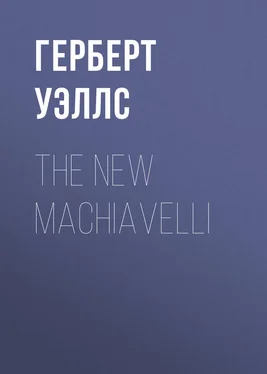Герберт Уэллс - The New Machiavelli
Здесь есть возможность читать онлайн «Герберт Уэллс - The New Machiavelli» — ознакомительный отрывок электронной книги совершенно бесплатно, а после прочтения отрывка купить полную версию. В некоторых случаях можно слушать аудио, скачать через торрент в формате fb2 и присутствует краткое содержание. Жанр: foreign_prose, foreign_sf, на английском языке. Описание произведения, (предисловие) а так же отзывы посетителей доступны на портале библиотеки ЛибКат.
- Название:The New Machiavelli
- Автор:
- Жанр:
- Год:неизвестен
- ISBN:нет данных
- Рейтинг книги:3 / 5. Голосов: 1
-
Избранное:Добавить в избранное
- Отзывы:
-
Ваша оценка:
- 60
- 1
- 2
- 3
- 4
- 5
The New Machiavelli: краткое содержание, описание и аннотация
Предлагаем к чтению аннотацию, описание, краткое содержание или предисловие (зависит от того, что написал сам автор книги «The New Machiavelli»). Если вы не нашли необходимую информацию о книге — напишите в комментариях, мы постараемся отыскать её.
The New Machiavelli — читать онлайн ознакомительный отрывок
Ниже представлен текст книги, разбитый по страницам. Система сохранения места последней прочитанной страницы, позволяет с удобством читать онлайн бесплатно книгу «The New Machiavelli», без необходимости каждый раз заново искать на чём Вы остановились. Поставьте закладку, и сможете в любой момент перейти на страницу, на которой закончили чтение.
Интервал:
Закладка:
And we went on a reading party that Easter to a place called Pulborough in Sussex, where there is a fishing inn and a river that goes under a bridge. It was a late Easter and a blazing one, and we boated and bathed and talked of being Hellenic and the beauty of the body until at moments it seemed to us that we were destined to restore the Golden Age, by the simple abolition of tailors and outfitters.
Those undergraduate talks! how rich and glorious they seemed, how splendidly new the ideas that grew and multiplied in our seething minds! We made long afternoon and evening raids over the Downs towards Arundel, and would come tramping back through the still keen moonlight singing and shouting. We formed romantic friendships with one another, and grieved more or less convincingly that there were no splendid women fit to be our companions in the world. But Hatherleigh, it seemed, had once known a girl whose hair was gloriously red. “My God!” said Hatherleigh to convey the quality of her; just simply and with projectile violence: “My God!”
Benton had heard of a woman who lived with a man refusing to be married to him – we thought that splendid beyond measure, – I cannot now imagine why. She was “like a tender goddess,” Benton said. A sort of shame came upon us in the dark in spite of our liberal intentions when Benton committed himself to that. And after such talk we would fall upon great pauses of emotional dreaming, and if by chance we passed a girl in a governess cart, or some farmer’s daughter walking to the station, we became alertly silent or obstreperously indifferent to her. For might she not be just that one exception to the banal decency, the sickly pointless conventionality, the sham modesty of the times in which we lived?
We felt we stood for a new movement, not realising how perennially this same emancipation returns to those ancient courts beside the Cam. We were the anti-decency party, we discovered a catch phrase that we flourished about in the Union and made our watchword, namely, “stark fact.” We hung nude pictures in our rooms much as if they had been flags, to the earnest concern of our bedders, and I disinterred my long-kept engraving and had it framed in fumed oak, and found for it a completer and less restrained companion, a companion I never cared for in the slightest degree…
This efflorescence did not prevent, I think indeed it rather helped, our more formal university work, for most of us took firsts, and three of us got Fellowships in one year or another. There was Benton who had a Research Fellowship and went to Tubingen, there was Esmeer and myself who both became Residential Fellows. I had taken the Mental and Moral Science Tripos (as it was then), and three years later I got a lectureship in political science. In those days it was disguised in the cloak of Political Economy.
2
It was our affectation to be a little detached from the main stream of undergraduate life. We worked pretty hard, but by virtue of our beer, our socialism and suchlike heterodoxy, held ourselves to be differentiated from the swatting reading man. None of us, except Baxter, who was a rowing blue, a rather abnormal blue with an appetite for ideas, took games seriously enough to train, and on the other hand we intimated contempt for the rather mediocre, deliberately humorous, consciously gentlemanly and consciously wild undergraduate men who made up the mass of Cambridge life. After the manner of youth we were altogether too hard on our contemporaries. We battered our caps and tore our gowns lest they should seem new, and we despised these others extremely for doing exactly the same things; we had an idea of ourselves and resented beyond measure a similar weakness in these our brothers.
There was a type, or at least there seemed to us to be a type – I’m a little doubtful at times now whether after all we didn’t create it – for which Hatherleigh invented the nickname the “Pinky Dinkys,” intending thereby both contempt and abhorrence in almost equal measure. The Pinky Dinky summarised all that we particularly did not want to be, and also, I now perceive, much of what we were and all that we secretly dreaded becoming.
But it is hard to convey the Pinky Dinky idea, for all that it meant so much to us. We spent one evening at least during that reading party upon the Pinky Dinky; we sat about our one fire after a walk in the rain – it was our only wet day – smoked our excessively virile pipes, and elaborated the natural history of the Pinky Dinky. We improvised a sort of Pinky Dinky litany, and Hatherleigh supplied deep notes for the responses.
“The Pinky Dinky extracts a good deal of amusement from life,” said some one.
“Damned prig!” said Hatherleigh.
“The Pinky Dinky arises in the Union and treats the question with a light gay touch. He makes the weird ones mad. But sometimes he cannot go on because of the amusement he extracts.”
“I want to shy books at the giggling swine,” said Hatherleigh.
“The Pinky Dinky says suddenly while he is making the tea, ‘We’re all being frightfully funny. It’s time for you to say something now.’”
“The Pinky Dinky shakes his head and says: ‘I’m afraid I shall never be a responsible being.’ And he really IS frivolous.”
“Frivolous but not vulgar,” said Esmeer.
“Pinky Dinkys are chaps who’ve had their buds nipped,” said Hatherleigh. “They’re Plebs and they know it. They haven’t the Guts to get hold of things. And so they worry up all those silly little jokes of theirs to carry it off.”…
We tried bad ones for a time, viciously flavoured.
Pinky Dinkys are due to over-production of the type that ought to keep outfitters’ shops. Pinky Dinkys would like to keep outfitters’ shops with whimsy ‘scriptions on the boxes and make your bill out funny, and not be snobs to customers, no! – not even if they had titles.”
“Every Pinky Dinky’s people are rather good people, and better than most Pinky Dinky’s people. But he does not put on side.”
“Pinky Dinkys become playful at the sight of women.”
“‘Croquet’s my game,’ said the Pinky Dinky, and felt a man condescended.”
“But what the devil do they think they’re up to, anyhow?” roared old Hatherleigh suddenly, dropping plump into bottomless despair.
We felt we had still failed to get at the core of the mystery of the Pinky Dinky.
We tried over things about his religion. “The Pinky Dinky goes to King’s Chapel, and sits and feels in the dusk. Solemn things! Oh HUSH! He wouldn’t tell you – ”
“He COULDN’T tell you.”
“Religion is so sacred to him he never talks about it, never reads about it, never thinks about it. Just feels!”
“But in his heart of hearts, oh! ever so deep, the Pinky Dinky has a doubt – ”
Some one protested.
“Not a vulgar doubt,” Esmeer went on, “but a kind of hesitation whether the Ancient of Days is really exactly what one would call good form… There’s a lot of horrid coarseness got into the world somehow. SOMEBODY put it there… And anyhow there’s no particular reason why a man should be seen about with Him. He’s jolly Awful of course and all that – ”
“The Pinky Dinky for all his fun and levity has a clean mind.”
“A thoroughly clean mind. Not like Esmeer’s – the Pig!”
“If once he began to think about sex, how could he be comfortable at croquet?”
“It’s their Damned Modesty,” said Hatherleigh suddenly, “that’s what’s the matter with the Pinky Dinky. It’s Mental Cowardice dressed up as a virtue and taking the poor dears in. Cambridge is soaked with it; it’s some confounded local bacillus. Like the thing that gives a flavour to Havana cigars. He comes up here to be made into a man and a ruler of the people, and he thinks it shows a nice disposition not to take on the job! How the Devil is a great Empire to be run with men like him?”
Читать дальшеИнтервал:
Закладка:
Похожие книги на «The New Machiavelli»
Представляем Вашему вниманию похожие книги на «The New Machiavelli» списком для выбора. Мы отобрали схожую по названию и смыслу литературу в надежде предоставить читателям больше вариантов отыскать новые, интересные, ещё непрочитанные произведения.
Обсуждение, отзывы о книге «The New Machiavelli» и просто собственные мнения читателей. Оставьте ваши комментарии, напишите, что Вы думаете о произведении, его смысле или главных героях. Укажите что конкретно понравилось, а что нет, и почему Вы так считаете.











